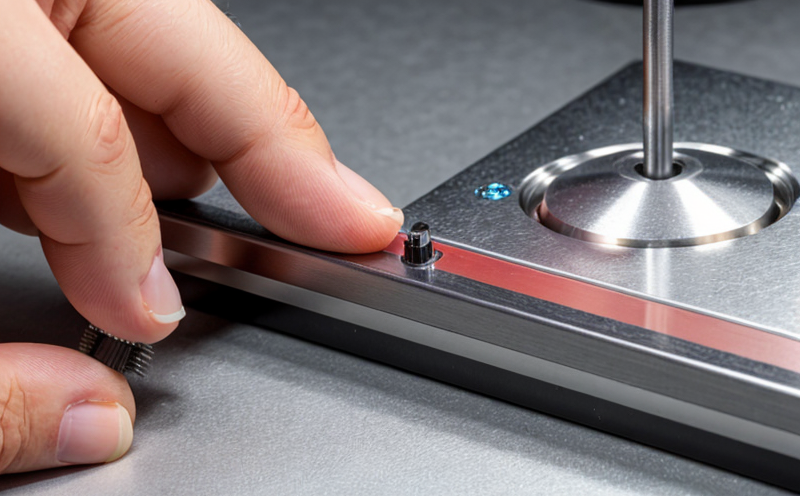Application of notch sensitivity testing in quality control
Unlocking Material Integrity The Crucial Role of Notch Sensitivity Testing in Quality Control
In todays fast-paced and highly competitive business landscape, ensuring the quality and reliability of materials is more crucial than ever. With the rise of global supply chains and the increasing demand for high-performance products, manufacturers are under intense pressure to deliver materials that meet exacting standards. One essential tool in achieving this goal is notch sensitivity testing, a laboratory service provided by Eurolab. In this comprehensive guide, well delve into the world of notch sensitivity testing, exploring its significance, benefits, and applications in quality control.
What is Notch Sensitivity Testing?
Notch sensitivity testing is a non-destructive evaluation technique used to assess the susceptibility of materials to stress concentrations or notches. A notch is a small notch or cut on the surface of a material that can significantly reduce its strength and durability. This type of testing is commonly employed in industries where reliability and performance are paramount, such as aerospace, automotive, construction, and energy.
Why is Notch Sensitivity Testing Essential for Businesses?
In todays manufacturing landscape, ensuring product quality and reliability has become a top priority. Notch sensitivity testing plays a vital role in achieving this goal by
Identifying material weaknesses By simulating the effects of notches or stress concentrations on materials, notch sensitivity testing reveals potential vulnerabilities that could lead to material failure.
Ensuring compliance with regulations Many industries are governed by strict regulations and standards that require manufacturers to demonstrate the durability and reliability of their products. Notch sensitivity testing helps businesses meet these requirements.
Optimizing product design By understanding how materials respond to notches, manufacturers can redesign their products to minimize the risk of material failure.
Key Benefits of Using Notch Sensitivity Testing in Quality Control
Eurolabs notch sensitivity testing services offer numerous advantages, including
Improved material integrity By identifying potential weaknesses and vulnerabilities, businesses can take corrective action to enhance material performance.
Enhanced product reliability By simulating real-world conditions, notch sensitivity testing ensures that products meet exacting standards for durability and reliability.
Reduced costs associated with material failure Notch sensitivity testing helps manufacturers avoid costly repairs, replacements, and downtime caused by material failure.
Increased customer satisfaction By ensuring the quality and performance of their products, businesses can build trust with customers and maintain a strong reputation in the market.
Compliance with industry standards Eurolabs notch sensitivity testing services help manufacturers meet regulatory requirements and adhere to industry standards.
How Does Notch Sensitivity Testing Work?
The process of notch sensitivity testing typically involves
Sample preparation Test samples are prepared according to specified standards, including the size, shape, and material composition.
Notching A notch is introduced onto the sample surface using a precision tool or machine.
Testing The sample is subjected to various loading conditions (tension, compression, bending) while measuring the effects of the notch on material behavior.
Data analysis Results are analyzed and interpreted by experienced engineers to determine the notch sensitivity of the material.
QA Frequently Asked Questions about Notch Sensitivity Testing
Q What types of materials can be tested using notch sensitivity testing?
A Notch sensitivity testing is suitable for a wide range of materials, including metals (aluminum, steel, titanium), polymers, ceramics, and composites.
Q How does notch sensitivity testing differ from other non-destructive evaluation techniques?
A Unlike other NDE techniques, notch sensitivity testing specifically simulates the effects of notches or stress concentrations on material behavior.
Q What are the limitations of notch sensitivity testing?
A Notch sensitivity testing is a laboratory-based technique that requires precise sample preparation and controlled loading conditions. Results may be influenced by factors such as sample geometry, notch depth, and loading rate.
Q Can notch sensitivity testing be used to predict material failure in real-world applications?
A While notch sensitivity testing provides valuable insights into material behavior under simulated conditions, it is essential to consult with Eurolabs experts to determine the relevance of these results to specific product applications.
Conclusion
Notch sensitivity testing is a powerful tool for ensuring material integrity and quality control. By understanding how materials respond to stress concentrations or notches, businesses can optimize their products, reduce costs associated with material failure, and improve customer satisfaction. Eurolabs laboratory services provide comprehensive notch sensitivity testing solutions that help manufacturers meet regulatory requirements and industry standards.
Dont compromise on the reliability of your products choose Eurolab for expert notch sensitivity testing services that unlock material integrity and ensure quality control excellence.




